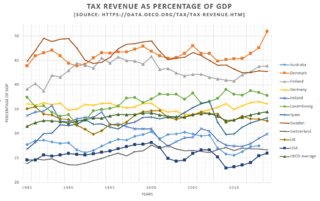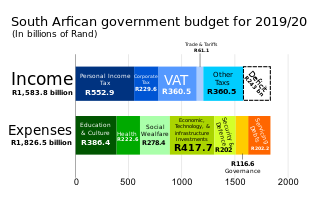Related Research Articles

A sales tax is a tax paid to a governing body for the sales of certain goods and services. Usually laws allow the seller to collect funds for the tax from the consumer at the point of purchase.
The Government of the 17th Dáil or the 10th Government of Ireland was the government of Ireland formed after the general election held on 4 October 1961. It was a minority government formed by Fianna Fáil, which had been in office since the 1957 election. It was the first election it had won since Seán Lemass had succeeded Éamon de Valera as leader.

The E-6 process is a chromogenic photographic process for developing Ektachrome, Fujichrome and other color reversal photographic film.

In business and accounting, net income is an entity's income minus cost of goods sold, expenses, depreciation and amortization, interest, and taxes for an accounting period.

DuPont analysis is an expression which breaks ROE into three parts.
A turnover tax is similar to VAT, with the difference that it taxes intermediate and possibly capital goods. It is an indirect tax, typically on an ad valorem basis, applicable to a production process or stage. For example, when manufacturing activity is completed, a tax may be charged on some companies. Sales tax occurs when merchandise has been sold.
Turnover or turn over may refer to:

Income taxes are the most significant form of taxation in Australia, and collected by the federal government through the Australian Taxation Office. Australian GST revenue is collected by the Federal government, and then paid to the states under a distribution formula determined by the Commonwealth Grants Commission.
The Tanzania Revenue Authority (TRA) is the government agency of Tanzania, charged with the responsibility of managing the assessment, collection and accounting of all central government revenue in Tanzania.

Washington, officially the State of Washington, is a state in the Pacific Northwest region of the Western United States. Named for George Washington—the first U.S. president—the state was formed from the western part of the Washington Territory, which was ceded by the British Empire in 1846, by the Oregon Treaty in the settlement of the Oregon boundary dispute. The state is bordered on the west by the Pacific Ocean, Oregon to the south, Idaho to the east, and the Canadian province of British Columbia to the north. It was admitted to the Union as the 42nd state in 1889. Olympia is the state capital; the state's largest city is Seattle. Washington is often referred to as Washington state to distinguish it from the nation's capital, Washington, D.C.

The European Union value-added tax is a value added tax on goods and services within the European Union (EU). The EU's institutions do not collect the tax, but EU member states are each required to adopt in national legislation a value added tax that complies with the EU VAT code. Different rates of VAT apply in different EU member states, ranging from 17% in Luxembourg to 27% in Hungary. The total VAT collected by member states is used as part of the calculation to determine what each state contributes to the EU's budget.
Due to the absence of the tax code in Argentina, the tax regulation takes place in accordance with separate laws, which, in turn, are supplemented by provisions of normative acts adopted by the executive authorities. The powers of the executive authority include levying a tax on profits, property and added value throughout the national territory. In Argentina, the tax policy is implemented by the Federal Administration of Public Revenue, which is subordinate to the Ministry of Economy. The Federal Administration of Public Revenues (AFIP) is an independent service, which includes: the General Tax Administration, the General Customs Office and the General Directorate for Social Security. AFIP establishes the relevant legal norms for the calculation, payment and administration of taxes:
In Algeria, the most important sources of government revenue have been oil and gas royalties.
In Albania, taxes are levied by both national and local governments. Most important revenue sources, include the income tax, social security, corporate tax and the value added tax, which are all applied on the national level. The Albanian Taxation Office is the revenue service of Albania.

Taxation may involve payments to a minimum of two different levels of government: central government through SARS or to local government. Prior to 2001 the South African tax system was "source-based", where in income is taxed in the country where it originates. Since January 2001, the tax system was changed to "residence-based" wherein taxpayers residing in South Africa are taxed on their income irrespective of its source. Non residents are only subject to domestic taxes.

The Ghana Revenue Authority (GRA) is the Ghana administration charged with the task of assessing, collecting and accounting for tax revenue in Ghana. The core mandate of the Authority is to ensure maximum compliance with relevant laws in order to ensure a sustainable revenue stream for government as well as the controlled and safe flow of goods across the county’s borders.
The United Arab Emirates is a federation of seven Emirates, with autonomous federal and local governments. An income tax decree has been enacted by each Emirate, but in practice, the enforcement of these decrees is restricted to foreign banks and oil companies.
Stoneacre Motor Group is a car dealership group based in the United Kingdom, having been established in December 1994.
Goods and Services Tax (GST) is a successor to VAT used in India on the supply of goods and services. GST is a digitalized form of VAT where you can also track the goods & services. Both VAT and GST have the same taxation slabs. It is a comprehensive, multistage, destination-based tax: comprehensive because it has subsumed almost all the indirect taxes except a few state taxes. Multi-staged as it is, the GST is imposed at every step in the production process, but is meant to be refunded to all parties in the various stages of production other than the final consumer and as a destination-based tax, it is collected from point of consumption and not point of origin like previous taxes.

A value-added tax (VAT), known in some countries as a goods and services tax (GST), is a type of tax that is assessed incrementally. It is levied on the price of a product or service at each stage of production, distribution, or sale to the end consumer. If the ultimate consumer is a business that collects and pays to the government VAT on its products or services, it can reclaim the tax paid. It is similar to, and is often compared with, a sales tax. VAT is an indirect tax because the person who ultimately bears the burden of the tax is not necessarily the same person as the one who pays the tax to the tax authorities.
References
- ↑ G.R. Putland, ".Critique of the Debits Tax and Turnover Tax", Prosper Australia ; retrieved Nov.9, 2009.